Trajectories (Spring 2018)
May 15, 2018
Maternal and Child Health — Rebeccah Bartlett
Strong advocate for mothers and children
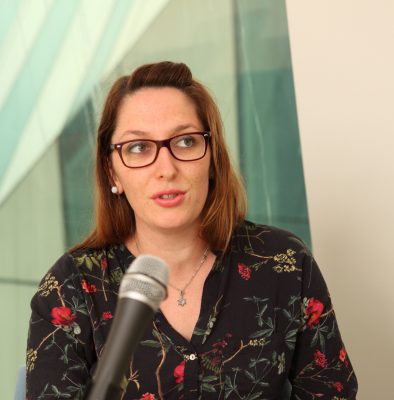
Rebeccah Bartlett (Contributed photo)
A newspaper story about the capsizing of a boat carrying refugees in the Mediterranean Sea helped change the course of Rebeccah Bartlett’s life. Among the victims was an Eritrean woman who drowned while giving birth. Days later, when divers pulled the bodies from the water, mother and son were still joined by the umbilical cord.
“This story both breaks my heart and emboldens it,” says Bartlett. “I have waited too long for someone else to start fixing the problems experienced by women and girl refugees. I have a solution, and I won’t wait any longer to share it.”
That solution is Shifra, a web app that connects refugees to high-quality sexual and reproductive health information that is local, effective and in a language they understand. Bartlett – an Australian who lives in Melbourne – began working on the mobile solution while studying for her Master of Public Health degree at the Gillings School.
By the end of 2018, Shifra will be accessible to the five largest non-English-speaking populations in the Australian state of Victoria.
“We will be national by the end of 2019 and global in 2022,” says Bartlett. “This will help us reach millions of women who experience the dangers associated with being a displaced woman or girl.”
 Bartlett says that Gillings School staff were supportive of Shifra from the beginning.
Bartlett says that Gillings School staff were supportive of Shifra from the beginning.
“Professor [Lewis] Margolis, Jen Cole [director of career development in the Gillings School’s maternal and child health department] and Naya Villarreal [program coordinator in the School’s Research, Innovation and Global Solutions unit] have been great advocates of my work and have connected me to many public health students interested in coming to work on Shifra as part of their summer practica,” she says.
A registered nurse-midwife who recently began a doctoral program at Australia’s Monash University, Bartlett also works for Birth for Humankind, an organization that helps pregnant, economically disadvantaged women access free birth support services.
“In all my work, I try to focus on reducing the health disparities experienced by women navigating pregnancy, childbirth and early childhood,” Bartlett says.
—Michele Lynn
Environmental Sciences and Engineering — Taylor Edmonds
Building bridges to Guatemala
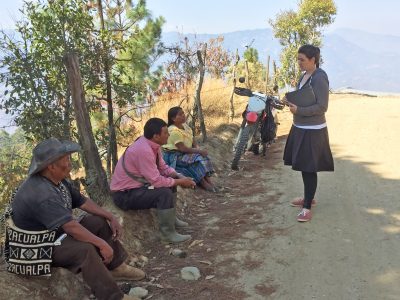
Taylor Edmonds (standing) interviews community members in Guatemala to determine their water and health needs. (Contributed photo)
In 2014, Taylor Edmonds earned a Master of Science degree in Environmental Engineering (MSEE). Now, she builds bridges.
The bridges are metaphorical ones, mind you – such as the one between a Guatemalan community in need and American organizations that get things done. As director of the engineering projects department for Asociación Civil La Libertad ALAS (lalibertad.org), Edmonds spent two-and-a-half years in Guatemala, much of it seeking out projects that would bring sustainable engineering solutions to rural Guatemalans’ water, sanitation, hygiene, education and health needs.
Edmonds volunteered with Engineers Without Borders (ewb-usa.org) throughout her school years, including a week on an assessment trip in Guatemala. She loved it so much that she returned two months later to work alongside volunteers from other nonprofits.
Her job was to visit the 38 villages near her rural dwelling and determine, with community members, public health projects that would make lives better. So far, she has worked with Engineers Without Borders on a project to bring potable water to more than 300 members of the community of Calante, who walk more than an hour to collect water during dry season.
With a group called Bridges to Prosperity (bridgestoprosperity.org), Edmonds works to build pedestrian bridges that allow villagers to cross flooded rivers during rainy season. Currently, community workers must walk up to two hours to reach their fields or take cattle to market. Edmonds also partners with two Rotary clubs to build and improve rural schools.
“I was in Guatemala for a week as a volunteer, and I couldn’t get the place or people out of my head,” she says. “It completely changed my life.”
Working on her thesis project prepared her for this kind of work, she says, because it forced her to look at problems differently.
“The strategy and process I learned in doing the thesis,” Edmonds says, “helped me figure out what to do, how to do it and who to partner with along the way, all of which I need in my work now.”
—Janine Latus
Epidemiology — Aaron Fleischauer
Confronting the opioid crisis in North Carolina
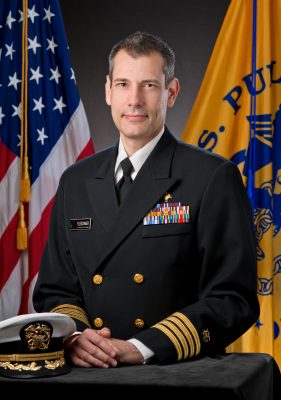
Capt. Aaron Fleischauer (Contributed photo)
Capt. Aaron Fleischauer earned his doctorate in epidemiology at the Gillings School in 2002, and began working for the Centers for Disease Control and Prevention (CDC) soon after. The CDC has deployed him across the U.S. to control outbreaks of West Nile virus, SARS, Monkeypox and avian influenza (H5N1).
Now, he is fighting his battles here at home in North Carolina, searching for solutions to the state’s raging epidemic of opioid addiction as chief science officer of the epidemiology section at the North Carolina Division of Public Health.
Overdose deaths in N.C. are up 2,000 percent in the past five years, he says. Heroin is the biggest problem, but in Appalachia, people are even injecting methamphetamine, which usually is taken orally.
“On top of the damage the drugs do,” Fleischauer says, “there’s another critical public health problem. Any time you put a needle in your arm, you’re risking infection.”
The prevalence of Hepatitis C in North Carolina is “through the roof,” he says. On the bright side, North Carolina has taken the lead in trying to reduce harm, including the provision of safe syringes and education about how to inject safely.
In collaboration with the UNC School of Medicine, Fleischauer also is studying the correlation between injection drug use and heart infections.
His training at the Gillings School prepared him to transition easily from academic epidemiology to boots-on-the-ground work with infectious diseases.
“The Gillings School was amazing at teaching the fundamentals of methodology,” he says. “Once a person grasps epidemiology methods, he or she can investigate any risk factor or outcome.”
For the past decade, Fleischauer has continued the Gillings School’s training tradition as an adjunct faculty member in epidemiology at the School. He also is helping to build a collaboration between the School and the N.C. health department, a venture he sees as a win-win situation. Academics can immerse themselves in applied work, while the health department will draw upon academic expertise to develop practica for students and advanced training for health department staff.
“This is the activity,” Fleischauer says, “that I’m most excited about – creating mentorships that will train the next generation of epidemiologists.”
—Janine Latus
Health Behavior — Charla Hodges
Working for everyone’s health

Charla Hodges (Photo by Judith Winkler)
Charla Hodges is excited about her work as a food environment consultant and senior project director at Counter Tools, a consulting group based in Carrboro, N.C.
The organization, co-founded in 2012 by Kurt Ribisl, PhD, professor and chair of the Gillings School’s Department of Health Behavior, and health behavior alumna Allison Myers, PhD, now board member and executive director, respectively, aims to provide tools, training and technical assistance to public health practitioners and researchers across 18 U.S. states.
As project director, Hodges helps clients and partners collect and share data to inform policy change. She works particularly with the Minnesota Department of Health to assess potential policy options and interventions for tobacco and food at the local level in that state.
“At Counter Tools, we work with communities to obtain data they need to make informed decisions,” Hodges says. “We help by trouble-shooting and setting up a data process so that all the information community leaders need is online in one place.”
Hodges says communities may want to look at data about tobacco, food or alcohol.
“The cool thing is,” she says, “the information we collect within a community isn’t available anywhere else.”
In 2014-2015, Hodges completed the dual master’s degree program that combines health behavior (in the Gillings School) with city and regional planning (in the College of Arts and Sciences). Hodges says having both degrees allows her to see her work through two lenses.
“If I speak to a client about planning and policy approaches related to the introduction of a food retailer Charla Hodges initiative, I can look at benefits and drawbacks from both perspectives.”
A native of Asheboro, N.C., Hodges has worked in the public health arena for several years. She began as a campus wellness educator while completing a bachelor’s degree in health education and promotion at East Carolina University. That was followed by three years with Carolina’s Alliance of AIDS Services, where she provided HIV risk-reduction education and conducted rapid HIV testing and HIV-prevention education at nightclubs and community events.
All of her most impassioned work – including co-chairing the Gillings School’s 2014 Minority Health Conference – is aimed at eliminating health inequities. That’s another reason Counter Tools is a great place for her to be.
—Judith Winkler
Nutrition — Erik Karlsson
Learning how poor nutrition increases susceptibility to flu
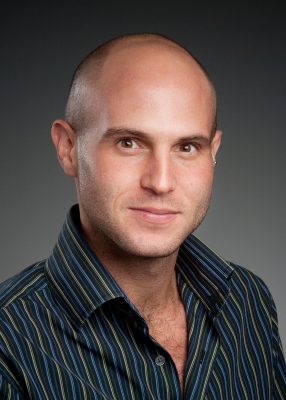
Dr. Erik Karlsson (Contributed photo)
Erik Karlsson, PhD, is celebrating the 100th anniversary of the 1918 flu epidemic by studying the correlation between flu and nutrition around the world.
Karlsson, who earned a doctorate in nutrition from the Gillings School of Global Public Health in 2010, worked as a postdoctoral fellow and staff scientist at St. Jude Children’s Research Hospital, studying influenza and the ways people who are obese respond to the flu vaccination. While at St. Jude, he also conducted infectious disease surveillance, focusing on influenza in animals and humans in South America, particularly in Chile and Colombia.
In 2017, Karlsson moved to Cambodia, where he now serves as senior research fellow in charge of respiratory virus research at Institut Pasteur du Cambodge. He studies seasonal human influenza, especially in children, and avian influenza, an endemic problem in Southeast Asia.
Cambodia is a rich environment for his studies. The ongoing transition to a western-style diet has led to massive increases in obesity, diabetes and coronary heart disease throughout Southeast Asia.
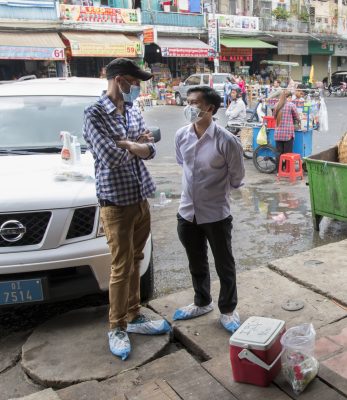
Dr. Erik Karlsson (left) talks with colleague Songha Tok at a poultry market in Phnom Penh, Cambodia. (Photo © Institut Pasteur du Cambodge/Dominique Tardy)
“Asia is now facing a double burden of poor nutrition,” Karlsson says, “where wasting, stunting and micronutrient deficiencies exist side-by-side with overweight and obesity.”
Those nutritional changes can have a profound impact on immunity. Poor nutrition – whether from too few or too many calories – can increase susceptibility to and severity of flu infection. Conversely, infection can cause nutrition imbalance in people who are sick, leading to a vicious cycle.
Karlsson says his training at the Gillings School not only included nutritional biochemistry and immunology, but also epidemiology, intervention and policy.
“Dr. Melinda Beck encouraged me to think of my research in global public health terms while answering every question rigorously, methodically and with focus,” Karlsson says. “These skills have given me the perspective and capability to translate my research from the laboratory bench to the clinical bedside and even to government-level policy.”
—Janine Latus
Biostatistics: Camille Morgan
Her work in public health led her to acquire a versatile set of skills
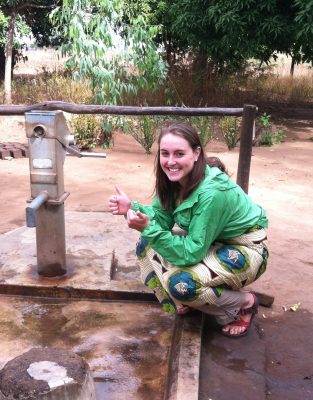
Camille Morgan checks a borehole in a Malawi village in 2015. Boreholes, deep narrow holes in the ground, produce water that is cleaner and safer to drink than surface water. (Contributed photo)
Camille Morgan, who earned a Bachelor of Science in Public Health in biostatistics in 2015, spent her first college summer working to improve water access in Bolivia. Eager to do more, she began working during her sophomore year at the UNC Water Institute. It was a rough year. She had no experience managing a database or analyzing data, and she considered quitting – but rather than abandon public health, she dove into the biostatistics program.
“I wanted to develop a skill set so I could analyze questions in public health research, whether in water, sanitation and hygiene, or diseases,” she says. “Having good research skills was important to me.”
Morgan, a Morehead-Cain Scholar, was back in the field the following summer, developing a survey and collecting data on water packet purifiers in two regions of Malawi.
After graduation, she pursued a fellowship at the National Cancer Institute’s Center for Global Health, improving her analytical skills and learning how funding decisions shape research. Realizing that having a knowledge of medicine was important for epidemiology research, she added pre-med night classes, including organic chemistry.
“No matter how difficult people say pre-med is, it was nothing compared to some of my undergraduate biostatistics classes,” she says. “Those really prepared me to work hard and set priorities for what I needed to get done.”
Morgan completed her pre-med coursework and took a job in Johns Hopkins University’s Department of International Health. This fall, she begins a Doctor of Medicine/Doctor of Philosophy program at UNC-Chapel Hill.
“UNC welcomes medical students who also want to complete a doctorate in public health,” she says. “The schools of medicine and public health work well together, and I knew that UNC would be a really good fit for me.”
—Janine Latus
Public Health Leadership Program: Sara Crocoll Smith
Thinking outside the box for better public health communications
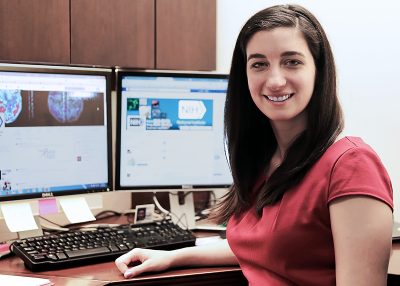
Sara Crocoll Smith (Contributed photo)
“The intersection of fiction and public health is a fascinating one,” says Sara Crocoll Smith, MPH, when asked to explain why she wrote a master’s thesis on the science behind fictional zombie outbreaks. “Sure, I was caught up in the zombie craze along with everyone else, but I wanted to take the science a step further.”
Smith, who obtained first a field epidemiology certificate and then a Master of Public Health in leadership from the Gillings School, served as a logistics readiness officer in the United States Air Force while completing her studies.
“My time in the Air Force offered an invaluable lesson in how to be a leader, yet I longed to further my knowledge of science and health,” she recalls. “Officers in the military are encouraged to obtain graduate degrees, and I jumped at the chance to pursue more education while I was serving my country.”
Back to that zombie thesis, though:
“The Centers for Disease Control and Prevention had a big hit with the zombie preparedness campaign they developed to make preparing for emergencies more fun. [See cdc.gov/phpr/zombie.] That was one of my all-time favorite government communications campaigns, and my master’s paper allowed me to do a deep dive into the topic and uncover my true love – public health communications.”
Smith graduated from the Gillings School in 2011. These days, she is a health communications specialist in the Food and Drug Administration’s (FDA’s) Center for Tobacco Products (CTP). The CTP, which regulates the manufacturing, marketing and distribution of tobacco products, aims to make tobacco-related death and disease part of America’s past.
As the CTP’s social media content strategist, Smith oversees the @FDATobacco Twitter account, creating original social media content that shares important regulatory updates and highlights the impact of tobacco use on health.
“It’s a great job!” she says. “I’ve found it incredibly rewarding to work in the area of substance use. The FDA commissioner recently announced a comprehensive plan that places nicotine addiction at the center of the Agency’s tobacco regulation efforts, partly in an effort to protect kids. I can’t imagine a more ground-breaking public initiative, and I feel close to the public health mission every day.”
—Jennie Saia
Health Policy and Management — Nicholas Sullivan
Making it easy for physicians to do their jobs
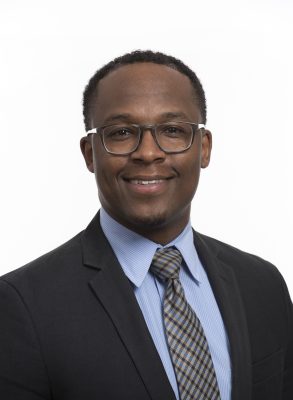
Nick Sullivan (Contributed photo)
Nick Sullivan, MHA, was well prepared when he was hired as vice president of neurosciences for the Greater Charlotte market of Novant Health, a multi-state network of clinics, outpatient facilities and hospitals. He credits the time he spent earning his Master of Healthcare Administration degree in 2012 with grooming him for the job.
His territory includes 60 providers – physicians, physician assistants and nurse practitioners – spread across 16 clinics.
“My job is to develop a strategic vision, recruit doctors and make it easy for them to do their jobs,” he says. “I take on the business functions and operational things that make clinics and operating rooms run. Most of my job is organizing budgets and making sure our physicians have the resources they need.”
Sullivan said he always learned something when he asked questions of Gillings School faculty members.
“I was surrounded by a great group of thinkers and experienced folks at the Gillings School,” he says. “We were taught about policy, business, finance, organizational development – everything that makes organizations tick. Everyone I met was interested in health care for the right reasons, and their example grounded me in values that made me a good leader.”
Sullivan also serves as a member of the Charlotte Chamber Young Professionals Board. Last year, the Charlotte Business Journal recognized him as one of the city’s “40 under 40” successful young professionals.
In his spare time, Sullivan works to shed light on mental health issues, particularly in relation to African-Americans. He serves on the board of Eustress Inc., a program designed to bring mental health awareness to the black community. Sullivan lost a nephew to suicide, and he has friends living with depression and bipolar disorder. For him, it’s a personal mission.
Closer to home, his daughter, born with a rare heart disorder, is the author of Embrace Your Cape, a children’s book aimed at helping children cope with the realities of major surgeries or medical diagnoses.
Of all his accomplishments, Sullivan says, it’s his daughter who makes him most proud.
—Janine Latus
Carolina Public Health is a publication of the University of North Carolina at Chapel Hill Gillings School of Global Public Health. To view previous issues, please visit sph.unc.edu/cph.
